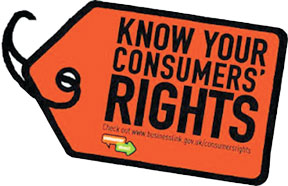|
Not many Sri Lankan consumers know they have Rights:
Help line Consumer Affairs Authority 24- hour-hotline 1977:
Duped, deceived and sold a dud
 Everyone is a consumer. But last Sunday's (March 15) World
Consumer Rights Day commemorated in muted style, showcased how
ignorant the so-called kings of the common market are, especially
about their rights that could and will safeguard them from being
duped, deceived and sold a dud. And just how ignorant the consumers
are, was revealed in an impromptu survey carried out by the Sunday
Observer last week, when a cross section of society admitted rather
unabashedly they knew nothing about consumer rights. This despite
legal access to rectify complaints of sub-standard consumer products
and unfair trading practices being in place, through the Consumer
Affairs Authority Act, for the past 30 years. Everyone is a consumer. But last Sunday's (March 15) World
Consumer Rights Day commemorated in muted style, showcased how
ignorant the so-called kings of the common market are, especially
about their rights that could and will safeguard them from being
duped, deceived and sold a dud. And just how ignorant the consumers
are, was revealed in an impromptu survey carried out by the Sunday
Observer last week, when a cross section of society admitted rather
unabashedly they knew nothing about consumer rights. This despite
legal access to rectify complaints of sub-standard consumer products
and unfair trading practices being in place, through the Consumer
Affairs Authority Act, for the past 30 years.
By Carol Aloysius
Not surprisingly, not many were aware that an authority, the Consumer
Affairs Authority (CAA) which could legally protect them against any
form of exploitation by unscrupulous traders, actually existed and had
its main office is in the heart of the metropolis of Colombo.
Ananda Kumar a young trishaw driver and father of two young children
said he had never heard of such an Act, but welcomed it nonetheless. "I
must have passed this particular office hundreds of times without even
knowing what it was or that it could protect our rights as consumers.
Now that I know, I will make it a point to go there personally if ever I
or my neighbours have any complaints to make over any of our future
purchases", he said.

Faulty items
Asked if he had ever been confronted with the problem of having
discovered that some item he had purchased had been faulty or not met
with the required standards claimed by the trader, he replied, "How
would I know anything about standards, when I'm totally illiterate. I
can neither read nor write although I can speak Sinhala and Tamil well.
But I do remember a day when my mother who was a road sweeper, brought
home a badly dented sardine tin. The contents were spoiled but we were
so hungry we ate the fish and fell sick after that. Another time the
electric bulb we had just bought fused and we had to spend the night
under candlelight.
If we knew we could complain about this to the vendor or an Authority
such as the Consumer Affairs Authority, we would have done so as we
desperately needed to get back our hard-earned money for our next meal.
But no one ever told us we had this means of re-dress, until now".
Being illiterate, he believes, has made him more vulnerable than his
literate counterparts when purchasing a product.
"Take for example the labels on a tin of sardines or any other food
product . Having labels on products are useless for people who can't
read or write like myself. How can I know what they say when I can't
read them? It is better to have this information given in the form of
pictures which is easy not only for us but for people who have mental
disabilities".
Nimal a computer analyst also confessed being ignorant about the
Consumer Protection Act said, "Last week I went to a shop in Kotahena to
buy a tyre for my motorcycle. The trader told me the tyre was new but
refused to give me a receipt . When I developed a tear in the tyre after
two days, I discovered it was a re-treaded tyre. When I went back to
demand my money from the trader he refused after insisting I should have
shown him a receipt. Now I know better. I will always insist on a
receipt or bill because of the useful information you have passed on
that I can now appeal and have legal redress against these unfair
traders who cheat us." he said.
A kilo of rice
Objectives of Consumer Protection
Given the importance of the Consumer Protection Act, here is a brief
summary of its objectives
* To protect consumers against the marketing of goods or provision of
services which are hazardous to life and property of consumers.
* To protect consumers against unfair trade practices .
* To seek redress against unfair trade practices , restrictive
practices or any other forms of exploitation of consumers by traders.
* To ensure that wherever possible consumers have adequate access to
goods and services at competitive prices.
* The Authority is responsible for the protection of the consumer by
issuing general directions to manufacturers or traders in respect of
labelling, price marking m, packaging , sale or manufacture of any goods
.
* Every direction issued by the Authority is published in the Gazette
in at least one Sinhala, one Tamil and one English news paper.
* Any manufacturer or trader who fails to comply with any direction
issued shall be guilty of an offence under the CAA Act. Any person who
removes, alters, obliterates , erases or defaces any label , description
or price mark on any goods shall also be guilty of an offence.
* A complaint relating to the sale of any goods or provision of
service should be made to the Authority in writing within three months
of the sale of such goods or provision of such services. The complaints
should be forwarded to the address given below:
No 27, Vauxhall Street, Colombo 2. |
Neville Perera, a 65-year-old trishaw driver admitted he had never
heard that there was an Act that could protect his rights as a consumer
until the Sunday Observer enlightened him. This is inspite of the fact
that he has studied upto the GCE O.Level and reads the newspapers with
avid interest.
"Last week my wife bought a kilo of rice which had stones and sand,
and the spices she bought from a boutique in Piliyandala also had been
adulterated. As the trader refused to give back her money she simply
threw it all away. I wish we had known about this Act then we could have
complained and got back our money," she said. When we informed him that
a complaint could be lodged with the Authority which entertained
complaints upto a period of three months, he said he would consider the
matter. Finding time to take her all the way to Colombo is my problem as
driving this three wheeler is a full time job", he said.
Renuka Samanmali, a houswife from Neluwa, didn't know about the Act
either. But being constantly advised by her husband, she said she was
prevented from being duped by unscrupulous traders simply because she
made it a point to read the labels on every product carefully before
purchasing them. "I even read the expiry dates on every yoghurt cup I
buy for the family. This information will be useful to me in the future"
she said.
Pathma Perera, a septugenarian housewife was one of the few
exceptions who confessed she was already aware of the Consumer
Protection Act. A retired teacher at St Anne's, Wattala, she said, "
Both me and my husband were aware of such an Act, but we didn't know
much about it. Nor did we have the address of the Authority in case we
wished to make a complaint.
Leaking K'oil cooker
But now that we have this information we can make good use of it .
You see, my sister who lives with us, recently bought an expensive large
kerosene cooker. But in a day it began to leak. When this happened she
took it back to the trader and asked for a replacement after producing
the receipt.
But he refused to take it back or refund the money. Since we didn't
know what to do, the stove has been put aside in our garage. If we can
get some kind of redress from the Authority we will be grateful", she
said.
An elderly gentleman who said he was a former university lecturer
gave us perhaps the most enlightened approach to the subject when he
raised the following pertinent questions:, "To have so many laws to
protect the consumer is no doubt beneficial. But the BIG question is ;
Are they being implemented? Who is monitoring them? Does the CAA have
enough personnel and inspectors to visit every wholesale and retail
consumer outlet in the island to see if their goods are upto the
standard?
We now see an increasing number of sub quality goods being uncovered
in recent raids including harmful toxic ingredients in the food we eat.
I read recently that the number of people injured or dead due to
faulty electrical gadgets is on the rise. We can't expect the CAA to do
everything. The public must also act responsibly. In my opinion, the
solution lies in our hands. If the public makes a collective effort to
read labels, check ingredients and expiry dates, before a purchase this
would go a long way in protecting our rights. Those who already know
there is an Act that protects them, should also make it their business
to spread this message.
Parents should teach children about consumer rights at home and
teachers should do it at school. It is then that this day will be a
meaningful one."
|

